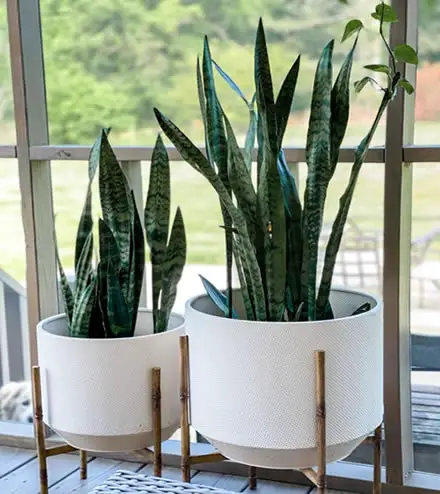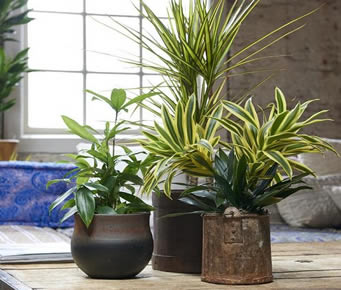Snake Plant vs Dracaena: Which Plant Wins in Air-Purifying Conditions?

If you’re looking to bring in a plant that clears the air and adds character to your space, two names rise to the top: the Snake Plant and the Dracaena. Both are stylish, easy to care for, and known for their air-purifying abilities — but which one fits your space, schedule, and aesthetic better?
Let’s compare them side by side and help you choose your perfect indoor purifier.
Table of Contents
Air-Purifying Power
-
Snake Plant: According to NASA’s Clean Air Study, this plant is one of the top performers in toxin removal. It targets formaldehyde, benzene, and xylene, and also releases oxygen at night — a rare quality among houseplants. Technically speaking the snake plant is a dracaena but is so popular it deserves its own spotlight.
-
Dracaena: While not quite as potent as the Snake Plant, certain varieties of Dracaena (like ‘Janet Craig’ and ‘Warneckii’) also remove airborne chemicals including trichloroethylene and formaldehyde.
-
They also help trap dust with their broad, arching leaves.

💡 Verdict:
Snake Plant edges ahead for toxin range and nighttime oxygen output, especially if placed in a bedroom. Dracaena holds its own but works best in spaces with daily light and movement.
📘 Related reads:
→ Snake Plant – Why the Snake Plant Helps You Sleep Better at Night
→ Dracaena – Dracaena: The Moisture-Loving Plant That Thrives in Steamy Bathrooms
Maintenance & Care Level
-
Snake Plant: Almost impossible to kill. It tolerates low light, thrives on neglect, and only needs watering every 2–3 weeks. It’s a go-to plant for beginners or anyone with a hectic lifestyle.
-
Dracaena: Still low-maintenance, but a little more sensitive. It prefers consistent watering and medium light. Overwatering can lead to root rot, and it dislikes fluoride in tap water.
💡 Verdict:
Snake Plant wins for pure ease. Dracaena is still manageable but requires a bit more care to avoid drooping or browning.
Smart picks:
-
Fluoride-filtering pitcher for watering Dracaena
Pet-Friendliness
-
Snake Plant: Toxic to pets. Ingestion may lead to vomiting and nausea.
-
Dracaena: Also toxic to pets. Similar symptoms, especially for cats.
💡 Verdict:
Neither is safe for pets. If you share your home with curious animals, you’ll need to elevate these plants or consider alternatives like the Bamboo Palm.
Aesthetic & Design Impact
-
Snake Plant: Bold, architectural, and upright. It brings a modern, structured look and works well in minimalist, Scandinavian, or industrial spaces.
-
Dracaena: Soft, arching, and leafy. With varieties that range from upright canes to lush foliage fountains, Dracaena fits boho, eclectic, and mid-century interiors.
💡 Design Tip:
-
Use Snake Plant to punctuate corners, frame doorways, or anchor shelves.
-
Use Dracaena for organic movement and greenery that feels integrated, not staged.
Suggested pairings:
-
Snake Plant in a matte black pedestal pot
-
Dracaena in a woven rattan floor planter
Best for Apartments, Offices, and Urban Homes
-
Snake Plant: Ideal for small, dark spaces with minimal airflow. It tolerates dry air from heaters and won’t mind if you forget it for weeks.
-
Dracaena: Better in rooms with stable lighting and moderate humidity. It doesn’t like drafts or abrupt changes.
💡 Verdict:
Snake Plant is perfect for city dwellers and frequent travelers. Dracaena suits people who want something soft and leafy but still easy.

Symbolism & Soul
-
Snake Plant: Symbol of protection, clarity, and perseverance. Its strong vertical lines represent boundaries and internal strength.
-
Dracaena: Associated with flexibility, growth, and quiet beauty. It embodies balance and emotional flow, especially when placed in corners or near windows.
Choose what your space — and spirit — needs more: unwavering stillness or flowing renewal?
🧭 Who Should Choose Which?
Choose the Snake Plant if:
-
You need something ultra-resilient
-
Your room is low-light or dry
-
You want strong visual lines and minimal upkeep
Choose the Dracaena if:
-
You prefer flowing foliage and soft movement
-
Your space gets gentle, daily light
-
You enjoy a bit more interaction with your plants
Other Comparisons You Might Like
Thanks for reading! I'm Michael — houseplant fanatic and your Pinterest plant guide.
Follow me on Pinterest for fresh updates 🌿



